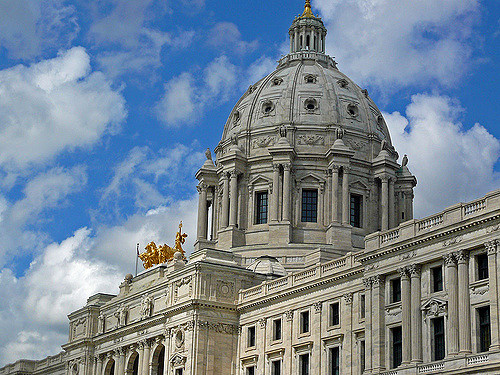
Matt Doll, Minnesota Environmental Partnership
Yesterday, on June 12, the Minnesota Legislature reconvened for a Special Session, as they were legally required to do owing to laws concerning Governor Walz’s emergency declaration. The Republican-controlled Senate has indicated that they only plan to stay in session until next Friday, leaving less than a week remaining to work out legislation on police accountability, the continuing health and economic crisis, and bonding, as well as unfinished business.
This seems a very limited span of time to address the broad array of issues facing Minnesotans, but MEP and our partners are focusing our effort with the time we have. As we wrote last week, we’re especially concerned with legislation to create a racially just future for Minnesotans, and with the bonding bill, which is an opportunity to help support thriving, resilient, healthy communities, and do our part for climate action.
With a struggling economy that is squeezing state and local budgets, this year’s bonding bill is especially critical, and as Bradley Peterson of the Coalition of Greater Minnesota Cities argues, the bill should be big. Borrowing funds inexpensively now will stave off economic hurt and environmental damage in the mid- and long-term.
What the bonding bill should do
This bill should first and foremost meet the most urgent needs of struggling communities. Amid the recent unrest in Minneapolis and St. Paul in the aftermath of George Floyd’s death, a number of buildings were damaged in underserved communities. The bonding bill can provide funds to these communities to help residents reimagine and shape the rebuilding of their spaces in an equitable way. In this case, the state can help effect just changes without imposing top-down decisions on communities that have historically borne the brunt of racial injustice.
Also key to environmental justice is investing in public transit. Minnesotans deserve to have accessible, affordable, clean options for getting to jobs, school, and other places. And while concerns about the spread of COVID-19 have caused many people to avoid trains and buses, studies in other countries have found encouraging signs that taking transit may be no more dangerous than any other public activity, and safer than spending time in an office or restaurant. Minnesota should not be scaling back our investment in clean transportation – MEP is advocating for $75 million in bonding for bus rapid transit in the Metro Area and $10 million for transit infrastructure in greater Minnesota.
We’ve written previously about how bonding can help provide safe water infrastructure to thousands of Minnesotans; that’s why MEP and a number of aligned organizations publicly launched the Fix the Pipes alliance last month. There is broad, bipartisan support for using bonding to upgrade Minnesota’s water systems, though we encourage Minnesotans to contact their legislators on this issue. We’re asking for at least $300 million for water infrastructure in Minnesota, and requesting that powered facilities run on renewable energy to save communities money and cut emissions.
Finally, with Minnesota farms facing economic and environmental crises, we’re asking for $55 million for programs that help farmers and land managers conserve and protect land to help mitigate climate change. This is an opportunity to help Minnesota’s land use sector go from a carbon emitter to a carbon absorber, while strengthening our vital soil and water resources.
All of these bonding projects are not only investments in Minnesota’s “stuff,” they are also jobs programs. These dollars mean jobs for pipefitters, engineers, bus drivers, electricians, farmers, retailers, and more. They can help light our way out of the COVID-19 recession and emerge as a stronger, healthier, more equitable state on the other side. Over the next six days, we will keep working to make sure lawmakers see the necessity for these bold solutions.